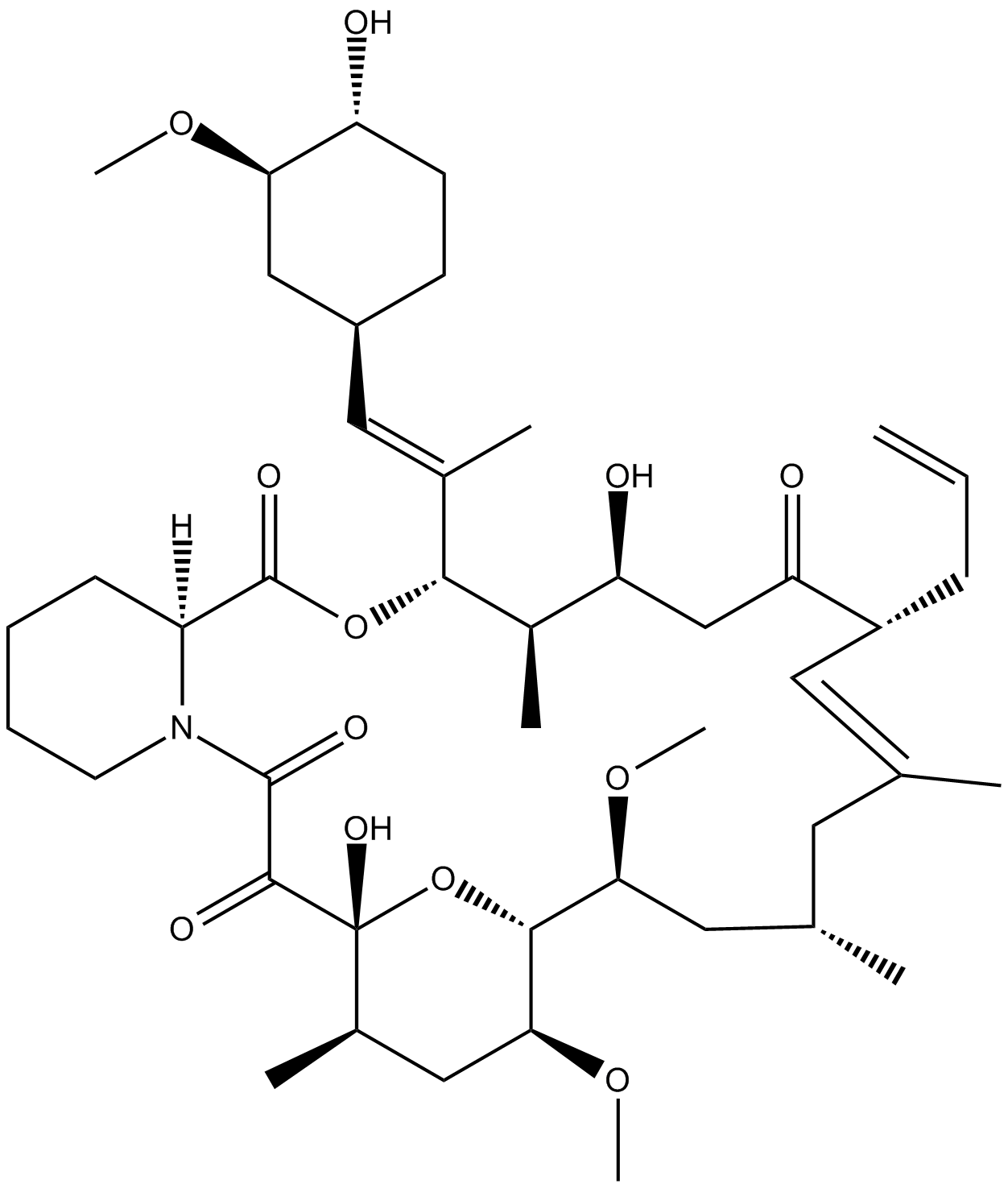Tacrolimus (FK506) (Synonyms: Tacrolimus) |
| Catalog No.GC16233 |
Tacrolimus (FK506), a macrolide antibiotic with potent immunosuppressive effects was isolated from Streptomyces tsukubaensis and has been previously used to prevent allograft and for treatment of autoimmune disorders in humans.
Products are for research use only. Not for human use. We do not sell to patients.

Cas No.: 104987-11-3
Sample solution is provided at 25 µL, 10mM.
Tacrolimus (FK506), a macrolide antibiotic with potent immunosuppressive effects was isolated from Streptomyces tsukubaensis and has been previously used to prevent allograft and for treatment of autoimmune disorders in humans[1-3].
Tacrolimus(FK506) (0-2 µM;24 h)reduces synthesis of type I collagen protein without affecting expression of collagen mRNAs in Human lung fibroblasts (HLFs)[8]. T cell proliferation in response to ligation of the T cell receptor is inhibited by tacrolimus(FK506) [4]. Ttacrolimus(FK506) (concentration gradient;48 h)inhibited oral squamous cell carcinoma (OSCC) progression in vitro [9].
Tacrolimus (FK506) was given intramuscularly at the dose of 0.5 and 1.0 mg/kg for three days before burn injury. Thermal trauma to the skin caused a statistically significant increase in MPO activity and MDA content in remote organs. Tacrolimus (FK506) was effective in reducing lipid peroxidation and neutrophil infiltration especially at 24 h postinjury in lung, liver and kidney[5]. Tacrolimus (FK506) has the ability to down-regulate free radical levels in severe ischemia-reperfusion liver, and tachlimus has also been shown to be an effective inhibitor of cytokine response[6]. A study on pulmonary fibrosis in mice suggested that FK506 can be a potent antifibrotic agent [7]. Tacrolimus (FK506) treatment inhibited activation of HSCs or reduced their number in the liver. In vivo, administration of Tacrolimus (FK506) at a dose of 4 mg/kg(i.p.; 4 weeks) completely prevented development of alcohol/carbon tetrachloride induced liver fibrosis in rats[8].
References:
[1]. Wiederrecht G, Lam E, et,al. The mechanism of action of FK-506 and cyclosporin A. Ann N Y Acad Sci. 1993 Nov 30;696:9-19. doi: 10.1111/j.1749-6632.1993.tb17137.x. PMID: 7509138.
[2]. Kino T, Hatanaka H, et,al. FK-506, a novel immunosuppressant isolated from a Streptomyces. II. Immunosuppressive effect of FK-506 in vitro. J Antibiot (Tokyo). 1987 Sep;40(9):1256-65. doi: 10.7164/antibiotics.40.1256. PMID: 2445722.
[3]. Kondo H, Abe T, et,al. Efficacy and safety of tacrolimus (FK506) in treatment of rheumatoid arthritis: a randomized, double blind, placebo controlled dose-finding study. J Rheumatol. 2004 Feb;31(2):243-51. PMID: 14760792.
[4]. Thomson AW, Bonham CA, et,al.Mode of action of tacrolimus (FK506): molecular and cellular mechanisms. Ther Drug Monit. 1995 Dec;17(6):584-91. doi: 10.1097/00007691-199512000-00007. PMID: 8588225.
[5]. Cetinkale O, Konukoğlu D, et,al. Modulating the functions of neutrophils and lipid peroxidation by FK506 in a rat model of thermal injury. Burns. 1999 Mar;25(2):105-12. doi: 10.1016/s0305-4179(98)00147-8. PMID: 10208383.
[6]. Garcia-Criado FJ, Palma-Vargas JM, et,al.Tacrolimus (FK506) down-regulates free radical tissue levels, serum cytokines, and neutrophil infiltration after severe liver ischemia. Transplantation. 1997 Aug 27;64(4):594-8. doi: 10.1097/00007890-199708270-00008. PMID: 9293871.
[7]. Nagano J, Iyonaga K, et,al.Use of tacrolimus, a potent antifibrotic agent, in bleomycin-induced lung fibrosis. Eur Respir J. 2006 Mar;27(3):460-9. doi: 10.1183/09031936.06.00070705. PMID: 16507844.
[8]. Manojlovic Z, Blackmon J, et,al.Tacrolimus (FK506) prevents early stages of ethanol induced hepatic fibrosis by targeting LARP6 dependent mechanism of collagen synthesis. PLoS One. 2013 Jun 3;8(6):e65897. doi: 10.1371/journal.pone.0065897. PMID: 23755290; PMCID: PMC3670911.
[9]: Li Y, Wang Y, et,al. Tacrolimus inhibits oral carcinogenesis through cell cycle control. Biomed Pharmacother. 2021 Jul;139:111545. doi: 10.1016/j.biopha.2021.111545. Epub 2021 Apr 16. PMID: 33873145.
Average Rating: 5 (Based on Reviews and 26 reference(s) in Google Scholar.)
GLPBIO products are for RESEARCH USE ONLY. Please make sure your review or question is research based.
Required fields are marked with *




















